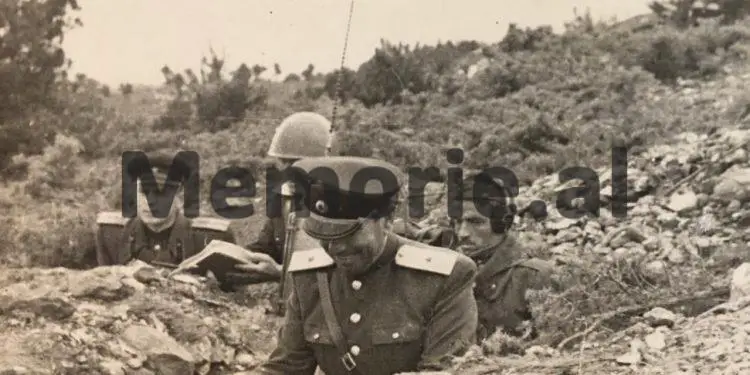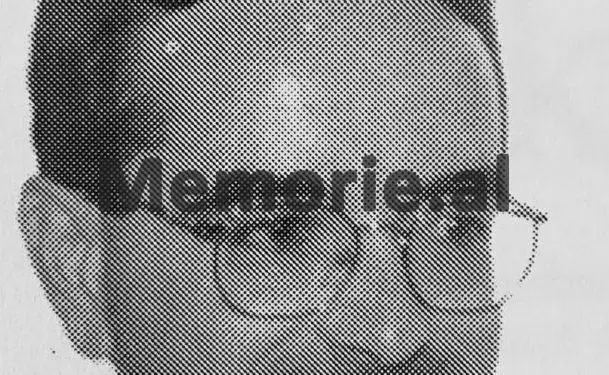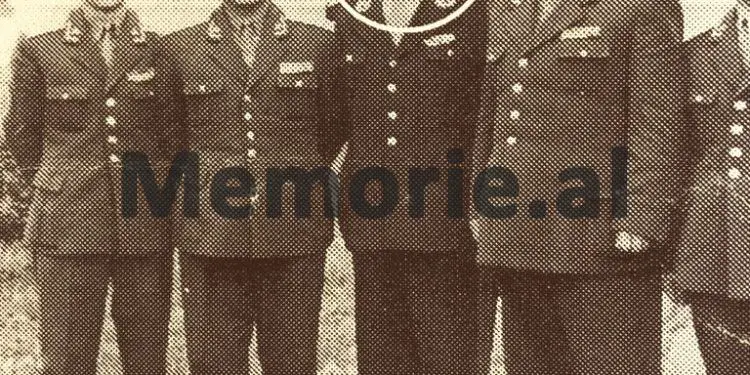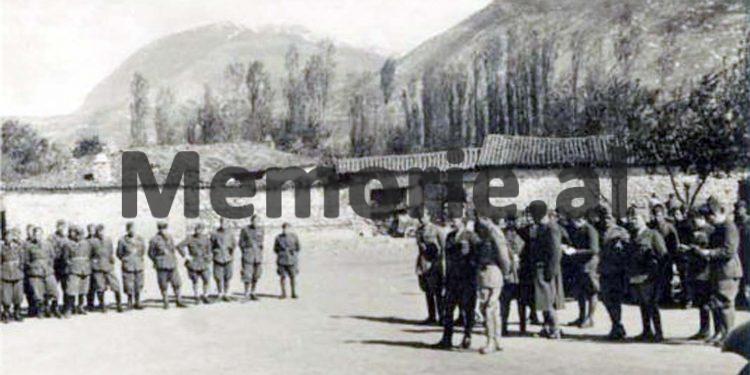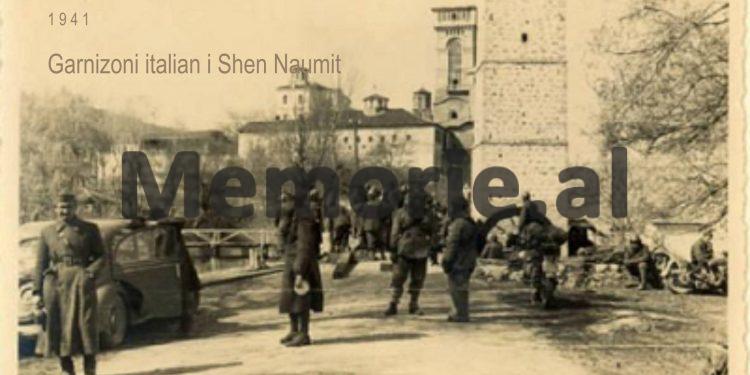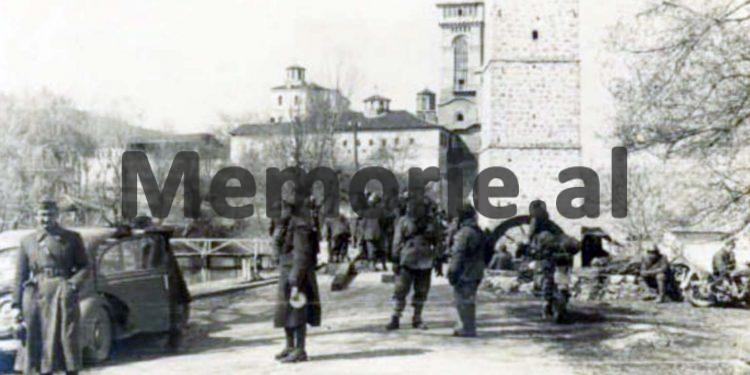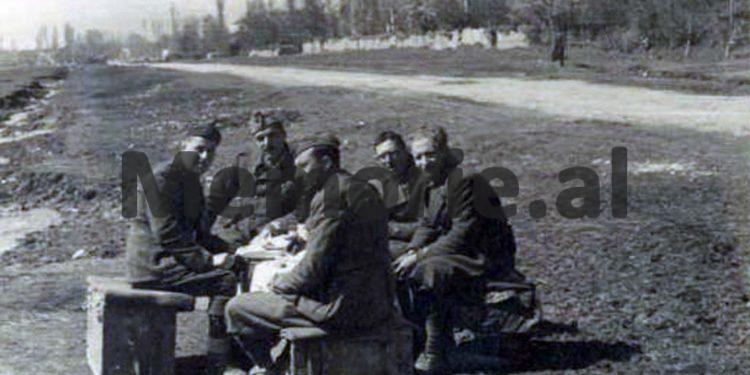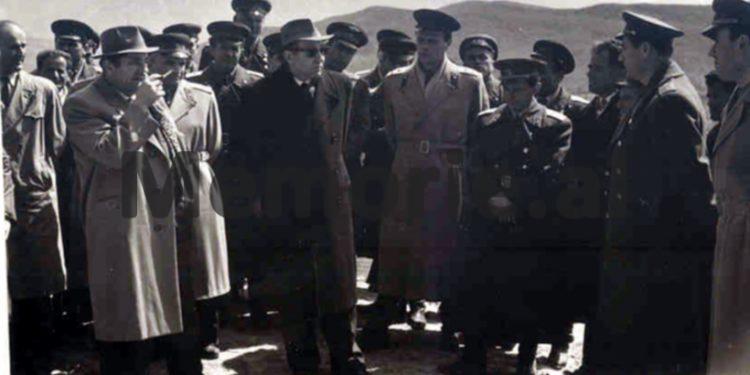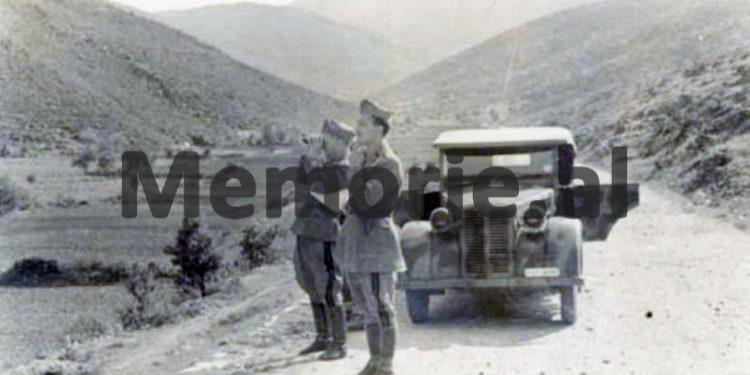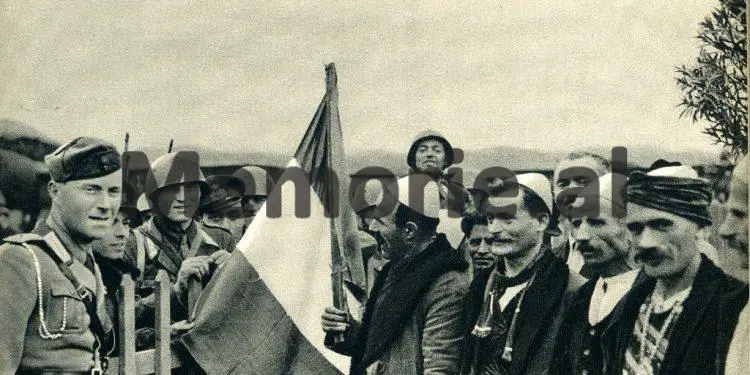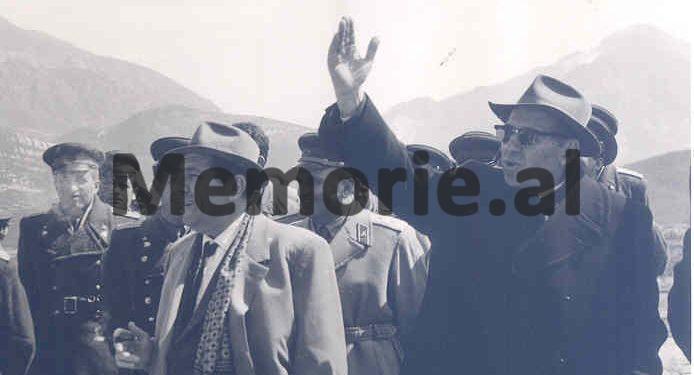Dashnor Kaloçi
Memorie.al publishes the unknown story of Todi Naço, originally from Pogradec, whose father, Spiro, a close friend of Fan Noli, after financing the construction of the Church of St. Kolli in the USA, in 1924, with Noli’s coming to power was appointed by him to the post of Secretary of the Municipality of Pogradec, as he was in great economic difficulties because he had spent all his savings for the establishment of that church. Sending his son, Todd, to study at the Royal Officers’ Training School in Tirana, from where he later received a state scholarship to study at the Torino Military Academy in Italy, where he graduated with honors in the field of Artillery, winning the rank of lieutenant.
His return to Albania and desertion from the Italian-Greek war front in 1940 where he was effective of the “Tomorri” Battalion and his engagement in the Anti-Fascist Movement with his close friend, Reshit Çollaku, in the area of Pogradec, as before was persecuted by the Italian authorities who went to arrest him and set fire to his house in the city of Pogradec, where the Italian officer, without his rich library, left a note saying: “Mr. Naço, it is a pity that a cultured man like you, turn into a bandit ”.
The emergence of the partisan Todd in Mehmet Shehu’s First Offensive Brigade, where he participated in all the battles that partisan formation fought until the end of the War, being as commander of Artillery and one of Mehmet Shehu’s close friends. Todd’s conflict with Enver Hoxha at the First Congress of the Albanian Communist Party in 1949, after Enver suspected that Naço and the other general, Tahir Kadare, had urged General Gjin Marku to ask Koci Xoxa in Congress for him to deepened his self-criticism regarding the guilt of the Commander-in-Chief, especially for linking and signing the Reciprocal Cooperation Treaty with Yugoslavia, which had subsequently brought about the collapse of the Albanian economy.
Testimony of his son, Fatos Naço, regarding the transfer that was made to Todi by being sent to study at the General Staff Academy “Voroshilov” of the Soviet Union, where he graduated with high results and his return to Albania. where he was appointed to several senior positions with the rank of major general, and as Commander of the Albanian Army’s Anti-Aircraft Artillery, where he served with rare will and passion until 1975 when he was accused of being a “close associate of Beqir Balluku.” ”And was interned in the district of Berat, where he worked as a mortar worker until 1985 when he died in exile in the village of Lapardha due to lack of a doctor and burial with carts by three members of the family.
“After we were deported from Tirana to Berat, on April 1, 1976, we were informed that we had to appear at the Front meeting which they had organized especially for our family to expose us to the public. In the meeting that took place in the open air in front of the Front offices of that neighborhood where all its residents had gathered, the three of us went to my father, mother and me. The meeting was opened by the Chairman of the Neighborhood Front, who addressed the audience, saying: ‘Today we have gathered to analyze the hostile activity of Todi Naço, one of the closest collaborators of the coup group of Beqir Balluku. We, as the leader of the front, have decided to deport him, but we have gathered to listen to your opinion. ‘ After he mentioned a number of very serious accusations against his father, the crowd immediately stood up, shouting hysterically, shouting: “On the rope, on the rope, the enemy of the people.”
This is what Fatos Naço, who tells the whole story of his family and father, Major General Todi Naço, considered one of the most prepared soldiers of the Albanian Army with the duty of Commander of the Artillery, testifies for Memorie. al He graduated from the military academies of Turin in Italy and the “Voroshilov” of the Soviet Union and in 1975 was beaten by Enver Hoxha, accused of being an “accomplice of the Beqir Balluku coup group”, being interned for 15 years in the villages of Berat, where and died in deep misery accused of being the enemy of the people.
What was Todi Naço’s past, how did he win the scholarship to continue his studies at the Military Academy of Turin, and why in 1940 did he desert from the National Army? Why in the first Congress of the Albanian Communist Party in 1949, he was considered an anti-party person together with other generals Gjin Marku, Tahir Kadareja and Nexhip Vinçani? How did General Naço remove the ranks in 1966 and how did he express himself when asked about it? Why in 1975 he was called a collaborator of Beqir Balluku’s coup group and what did he talk to Mehmet Shehu about when he was not allowed to deliver the speech on the occasion of the 30th anniversary of the Liberation?
How was he unmasked in the city of Berat where he was sent to work as a laborer in the preparation of mortar? How was he treated during the period of internment in the village of Lapardha and what did he write in his diary about the figure of Enver Hoxha and how did he ironize it?
Spiro Naço, a friend of Noli’s, is funding the Church of St. Kolli in the United States
Todi Naço was born in 1914 in the city of Pogradec, where his family originated from. His father, Spirua, joined Fan Noli during the early 1920s, and after the “June Revolution” in his government, he was appointed Secretary of the Pogradec Municipality. According to the testimony of his nephew, Fatos Naç, Spiro was known by all the people of Pogradec and especially by the Albanian diaspora in America, for the great financial contribution he gave to Fan Noli for the construction of the Church of St. Kolli in the USA. Spending all his savings on that church, Spiro returned to his hometown of Pogradec, not being able to buy any property or possessions. Under those circumstances, he was forced to send his eldest son, Todd, to study at the Royal Military School for Officers in Tirana, which he graduated within in 1935. After that, King Zog’s government awarded him a state scholarship to continue his studies at the Military Academy in Turin, Italy, (in the branch of the Artillery Application) which he graduated with excellent results, receiving the maximum points in the defense of the diploma. After graduating as an officer with the rank of lieutenant in the specialty of artillery, in 1939, Todi returned to Albania and the royal government of that time assigned him to serve in the Military Garrison of the city of Shkodra.
Todi, in the Italo-Greek war, with the “Tomorri” battalion
According to the testimony of Fatos Naço, being an effective member of the Albanian National Army with the rank of captain, in 1940, Todi was assigned to take part in the Italo-Greek war with the “Tomorri” Battalion, which consisted of Albanian soldiers and officers. Like many Albanian soldiers, Todi refused to fight the Greek army and abandoned the war front. That caused the arrest warrant to be issued against him, and when the carabinieri went to check on the house in Pogradec, the Italian officer was surprised when he saw an extremely large library with some of the most wanted books. After contemplating the library, the Italian officer left Todd with a piece of paper that read, “Mr. Todd, I’m sorry a man like you end up as a bandit,” and then he left without burning his house as he did. had the order. After leaving the Italian-Greek war front, Todi returned to his home in Pogradec, where he was hiding for fear of arrest. At this time he became associated with his close friend, Reshit Çollaku, and together with him, they organized the formation of partisan detachments of that province until June 1943 when he joined the First Assault Brigade of Mehmet Shehu. In that partisan formation, he was assigned the task of Commander of the Artillery, and he took part in all the fighting that that brigade fought. Being a specialized and highly skilled artilleryman, in November 1943, shortly after the Germans had entered Albania, Todi Naço was assigned by the General Staff and took part in the artillery attack on the National Assembly which was conducting works under the chairmanship of the Regency at King Zog’s Palace on the Sauk Hills.
Hit by Enver in the First Congress of the SNP
After the end of the war, Todi was appointed for some time as Commander of the Artillery in the Divisions of Korça and Elbasan and then came to Tirana with the duty of Chief of Staff in the Artillery Command, which was commanded by Major General Hulusi Spahiu. At the First Congress of the Communist Party of Albania in 1949, Todi Naço suffered the first blow together with Tahir Kadare, Gjin Marku, and Nexhip Vinçani, after Enver Hoxha suspected them of wanting and inciting Koci Xoxen to talk about guilt. of the Commander-in-Chief, who, in the capacity of the Prime Minister, had signed the Treaty of Friendship and Reciprocal Cooperation with Yugoslavia, which had led to the collapse of the Albanian economy. Also, one of the other accusations made against Todi Naço and other generals at that time, Gjin Marku, Tahir Kadare, and Nexhip Vinçani, was that they wanted to overthrow the Chief of Staff Beqir Balluku and take control of the direction of that Ministry. In this regard, Todi Naço’s son, Fatosi, recalls: they never wanted to copy Beqir Balluku. They were and only demanded that in the leading positions of the Albanian Army and in the Ministry of People’s Defense be placed capable and educated soldiers and not party members “, Fatosi recalls, regarding the accusation made against his father in the First Congress of the Communist Party of Albania.
At the Voroshilov Military Academy in Moscow
Following allegations made by Todi Naço at the First SNP Congress to remove him, he was sent to study in the Soviet Union at the Voroshilov State Military Academy in Moscow, where he graduated with honors. in 1955, further specializing in the branch of Artillery, for which he had graduated in Turin since 1939. In connection with this, his son Fatos testifies: “After returning from the Soviet Union, Todi was given the rank of general- major and was appointed Commander of the Artillery at the Ministry of People’s Defense in Tirana. He remained in this position until the end of the 1960s, working with great will and passion for the modernization of the Albanian Army, when, on the direct proposal of Enver Hoxha, he was appointed Commander of the Anti-Air Defense at the Ministry of Defense… From many of his father’s friends and colleagues, Todd’s appointment to the post was made by Enver Hoxha, as the Soviet Union had occupied Czechoslovakia at the time, and Enver feared any airstrikes by the Soviets on Albania. Like many other soldiers, his father suffered greatly in 1966, and it was said that the army’s number one violation, which distinguished the subordinate from the superior, was broken. When one of his colleagues reminded him of the removal of the ranks, he replied with irony: “It doesn’t hurt much because I was fired because I now have the pipe,” recalls Fatosi, the second son of Major General Todi Naço, the commander of the Artillery. Anti-aircraft, which all his former military colleagues always remember with the lighted pipe.
The coup in 1975, as “collaborator of Beqir Balluku”
In 1974, like many other senior soldiers in the Ministry of People’s Defense and the Albanian Army, Todi Naço was beaten by Enver Hoxha, labeling himself as “collaborator of the Beqir Balluku and Petrit Duma coup group.” But to what extent did Enver Hoxha extend the blow to General Naço, already without ranks and what measures did he take against him? In this regard, his son, Fatosi, recalls: “My father felt that he would be hit by Enver Hoxha, who did not easily forget his ‘involvement’ in the First Congress of the Albanian Communist Party in 1949. Based on this fact, as was the case with some of the top leaders of the Albanian Army, in November 1974 he was barred from giving a speech which he had prepared on the occasion of a jubilee meeting in honor of the 30th anniversary of The liberation of Albania. The father was very upset by this and went to complain to Mehmet Shehu, who had his closest and most confidential friend. I do not know exactly what the father talked to Mehmet about, as his father at that time never had such conversations at home with us, but years later he showed that Mehmet advised him and after that meeting, he prepared spiritually for him. cope with any situation that may arise. And so it really happened. I remember as now December 1975, when my father came home extremely upset after being expelled from the party. He entered the room where I was teaching and said, “Fatos, you are an adult now and you need to understand the situation I am in, so you have to be brave and not be afraid of anything that looks like it.” After that, my father started burning all the splits with degrees that he had kept since 1966, as well as many books and magazines in foreign languages, which filled almost the entire large library of our house. After being expelled from the party, it was not long before his father was informed that he had to leave Tirana with his family. He went to the Executive Committee and said to the Chairman, “So soon.” The mayor replied that he could not help him, as he had the order form above. The next day, near the entrance of our apartment there at the Aviation Palaces (New Tirana), we saw the car that had come to pick us up according to the order given from “above”. Before we left for Berat, the father talked to those in the Army and gave them the whole library of the house, which consisted of hundreds of book titles “, Fatosi recalls the departure of his family from Tirana in December ’75, after his father, Todi Naço, was described as a “collaborator of Beqir Balluku’s coup group”. Memorie.al
continues tomorrow




